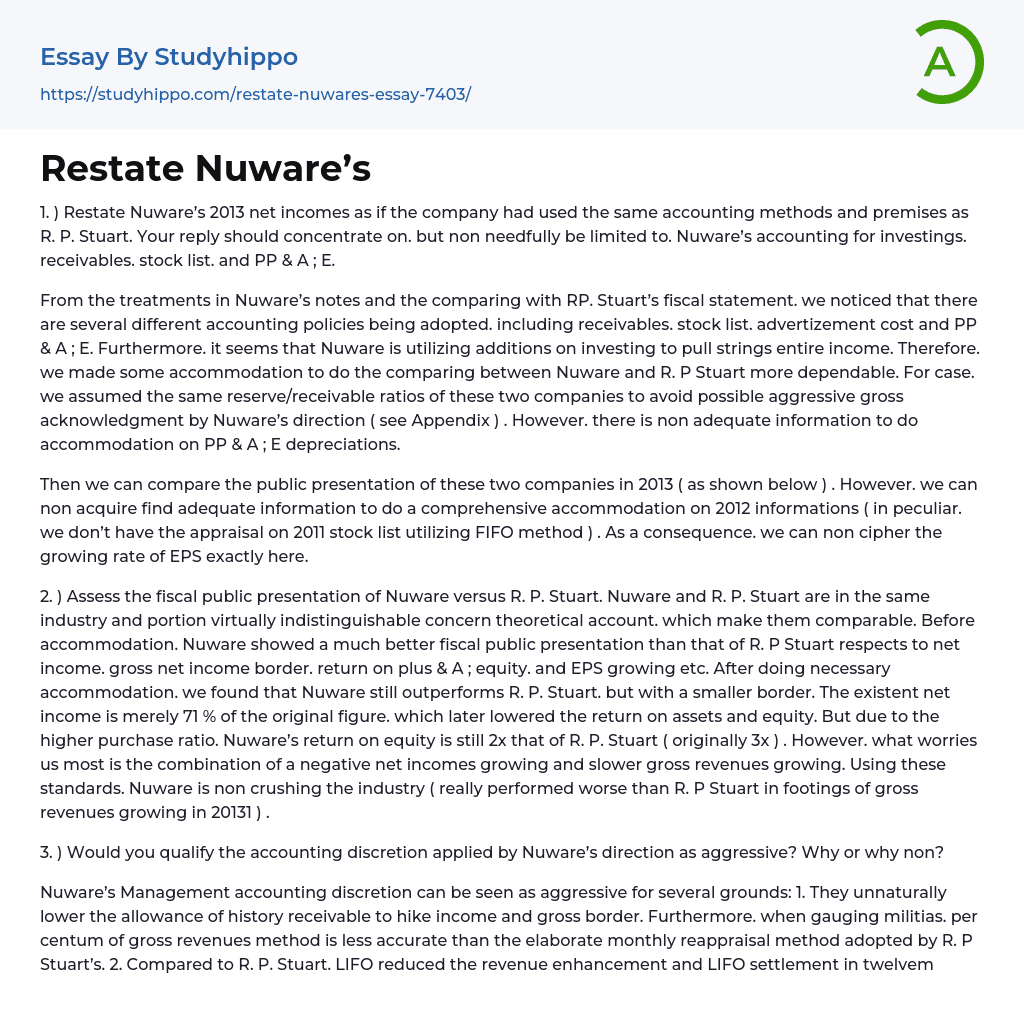1.) The 2013 net incomes of Nuware, if accounted for using the same methods and premises as R. P. Stuart, reveal differences in accounting policies regarding investments, receivables, inventory, and PP&E. Nuware also appears to manipulate total income through investment gains. To ensure a more reliable comparison, adjustments were made to assume the same reserve/receivable ratios between the two companies. However, there is insufficient information to make adjustments for PP&E depreciation. The performance of Nuware and R. P Stuart in 2013 can be compared based on these adjustments. It is not possible to make a comprehensive adjustment for the 2012 data due to lack of information, particularly regarding inventory valuation using the FIFO method. Consequently, the exact growth rate of EPS cannot be calculated accurately here.
2.) The financial performance of Nuware
is assessed against R. P. Stuart.Nuware and R. P. Stuart both operate in the same industry and have similar business models, making them comparable. Prior to adjustments, Nuware had a stronger financial performance compared to R. P. Stuart in terms of profit, gross profit margin, return on assets and equity, and EPS growth. However, after making necessary adjustments, it was found that Nuware still outperforms R. P. Stuart, but by a smaller margin. The actual net profit is only 71% of the original figure, which also reduced the return on assets and equity. Despite this, due to a higher leverage ratio, Nuware's return on equity is still twice that of R. P. Stuart (originally three times). However, the concern lies in the negative earnings growth and slower sales growth. Based on these criteria, Nuware is not outperforming the industry and actually performed worse than
R. P. Stuart in terms of sales growth in 20131.
In terms of accounting discretion, Nuware's management can be seen as aggressive for several reasons. Firstly, they artificially lower the allowance for accounts receivable to boost income and gross margin. Additionally, when estimating reserves, the percentage of sales method used by Nuware is less accurate than the detailed monthly review method employed by R. P. Stuart's management. In comparison to R. P. Stuart's management,The use of Last-In, First-Out (LIFO) method decreased the revenue growth and LIFO settlement in 2013, leading to abnormally high profits. Additionally, the recognition of unrealized gains for available for sale investment assets also contributed to the increased profits, which should be evaluated separately from the core business income. It is important to conduct a detailed analysis to consider any aggressive assumptions when depreciating Property, Plant, and Equipment (PP&E).
- Auction essays
- Balanced Scorecard essays
- Battle essays
- Business Plans essays
- Expense essays
- Income essays
- Intranet essays
- Maintenance essays
- Net Income essays
- Security Guard essays
- Simulation essays
- Singapore Airlines essays
- Asset essays
- Capital market essays
- Day Trading essays
- Depreciation essays
- Discounted Cash Flow essays
- Foreign Direct Investment essays
- Funds essays
- Futures Trading essays
- Internal Rate Of Return essays
- Million essays
- Revenue essays
- Absolutism essays
- Appeal essays
- Bourgeoisie essays
- Contras essays
- Corporate Governance essays
- Corruption essays
- Democracy essays
- Democratic Party essays
- Developed Country essays
- Dictatorship essays
- Elections essays
- European Union essays
- Federalism essays
- Foreign essays
- Foreign policy essays
- Gentrification essays
- Hillary Clinton essays
- Income Tax essays
- International Relations essays
- John Marshall essays
- John Stuart Mill essays
- Left-Wing Politics essays
- Liberty essays
- Military essays
- Monarch essays
- Monarchy essays
- Political Corruption essays




